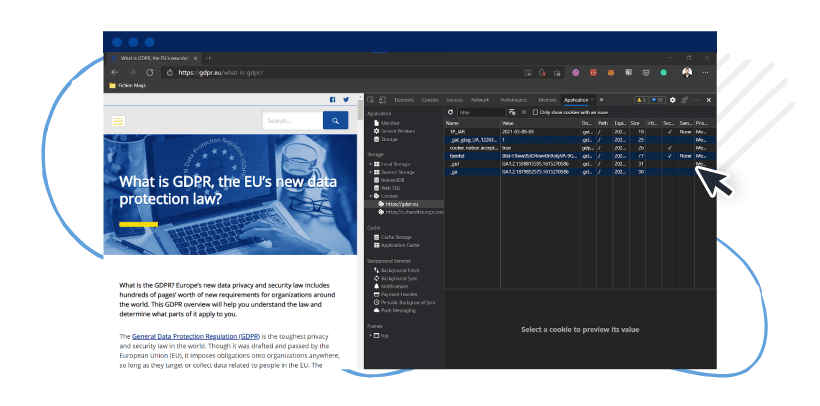What are website cookies?
Website cookies are small text files that internet browsers store on your computer. They are used to identify you and remember certain information about you, such as your preferred language for a website, whether you are logged in, and what you put in your online shopping cart.
Did you know your computer hides a jar of cookies deep inside its folder structure? If you’re using Google Chrome, go to “C:Users[your user name]AppDataLocalGoogleChromeUser DataDefault” and search for “cookies.”
There it is. A small file that websites use to figure out who you are, how you behave online, what you search for, and more.
Different types of website cookies
Just like in real life, there are many different types of cookies. Firstly, you have session cookies and persistent cookies. Session cookies are stored in your computer’s memory and permanently removed when you close your browser session. Persistent cookies are stored on your computer’s disk and have an expiration date. These cookies are only removed from your disk once they’ve gone past their expiration date.
Secondly, you have first-party cookies and third-party cookies. First-party cookies are placed by the website you’re on at that moment and are often essential for the proper functioning of that website. They remember language settings, log-in settings, customer analytics data, etc.
Third-party cookies are placed by a website other than the website you’re currently on. Much of digital advertising relies on these types of cookies. Ads that follow you around as you browse the internet rely heavily on these third-party cookies.
Protecting online privacy
Cookies serve an important role in digital advertising but are increasingly seen as a breach of user privacy. In the European Union’s General Data Protection Regulation (GDPR), websites must gain “informed consent” from users before storing non-essential cookies.
If your website uses cookies, you must do the following:
- Let users know that your website uses cookies.
- Provide users with information on how you will use their information.
- Provide users with a way of accepting or refusing the use of cookies.
- If users refuse, ensure that you won’t store cookies on their computer.
If you’re unsure whether your website uses cookies, visit your website and go to your browser’s developer tools. If you’re using Chrome, visit application, storage, cookies, and select your website. There’s a high chance you’ll see at least a few cookies there.

The problem with regulations like GDPR is that websites have implemented cookie banners that users have to agree to if they want to gain access to the website. This trend has worsened the user experience of the internet and, similar to Terms & Conditions, people tend to just click agree as fast as they can.
Toward a cookieless future
Although regulations have largely been ineffective, users increasingly care about their online privacy. That’s why browsers are taking action against third-party cookies:
- Safari limits the lifespan of persistent cookies to only seven days.
- Firefox and Edge block third-party cookies by default.
- Chrome is gradually phasing out third-party cookies.
Chrome is by far the biggest browser in the world, which is why they’re a bit more careful in phasing out third-party cookies. Many digital advertisers still rely on them. Nonetheless, it won’t be long before third-party cookies are gone from the internet.
This doesn’t mean that digital advertising is over. If you’re a digital marketer, you’ll just need to find other ways to advertise online. For example, you could turn to contextual advertising. While you might not be able to follow users around anymore, you can place your ads on websites that are relevant to your product. Advertise your beard oil on a male grooming website.
Additionally, you can focus more on content marketing. Become an authority in your respective field by creating stellar content coupled with the right SEO practices. Let the customer find you, capture their email, and create a strong relationship with them. This requires more effort, but it’s more sustainable than creating an ad that follows people around wherever they go.
While a cookieless future might sound scary at first, it’s a win for consumer privacy and a great incentive for companies to focus on better user experience and more sustainable advertising practices. Ultimately, this should lead to a more private, better internet.
With cookies on their way out, you’re going to need another way to reach your target audience. Enter: content! Talk to a content specialist at ClearVoice about getting a content marketing strategy — and high-quality content — created for your brand today.



